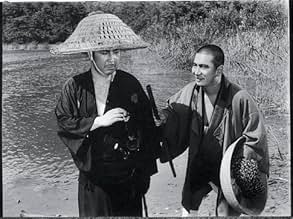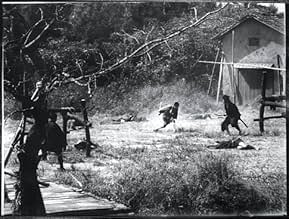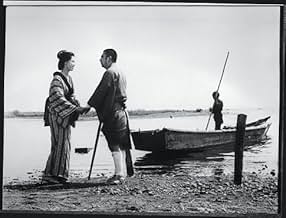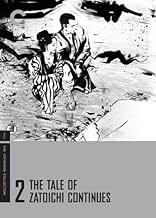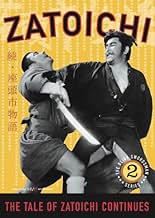IMDb RATING
7.2/10
3K
YOUR RATING
The blind masseur and swordsman, Zatoichi, learns of a powerful political figure's secret and is quickly tailed by a group of killers.The blind masseur and swordsman, Zatoichi, learns of a powerful political figure's secret and is quickly tailed by a group of killers.The blind masseur and swordsman, Zatoichi, learns of a powerful political figure's secret and is quickly tailed by a group of killers.
Yaeko Mizutani
- Setsu
- (as Yoshie Mizutani)
Tomisaburô Wakayama
- Nagisa no Yoshiro
- (as Jô Kenzaburô)
- Director
- Writers
- All cast & crew
- Production, box office & more at IMDbPro
Featured reviews
Roughly a year after his first run-in with the shady Yakuza types of small-town Japan, a notorious blind swordsman blows back into town seeking an encore. Actually, the hopeful pacifist Zatoichi is merely interested in paying his respects at the grave of a fallen comrade, the honorable samurai he out-dueled last time, but the shadier denizens of this corrupt village have long memories and see his visit as an opportunity for revenge.
While that drama plays out, Ichi makes enemies with a misbehaving prince, befriends a trio of prostitutes and crosses paths with another acquaintance: a one-armed former romantic rival who still carries a grudge. The latter is portrayed by Tomisaburo Wakayama, later known for his lead role in the Lone Wolf and Cub films (and star Shintaro Katsu's real-life brother), which makes his eventual duel with Ichi doubly interesting as a sort of unofficial pre-crossover. Not for the last time, either, as 1970 would produce a match between our blind protagonist and Toshirô Mifune's Yojimbo... but that's a topic for another time.
As The Tale Continues is concerned, I found it a mild step down from the first film. There's more action this time, and a much faster pace, but the additional subplots make for a less focused narrative and drain power from the larger developments and reveals of the third act. Another outstanding performance from Katsu, though, and wow, what a final shot!
While that drama plays out, Ichi makes enemies with a misbehaving prince, befriends a trio of prostitutes and crosses paths with another acquaintance: a one-armed former romantic rival who still carries a grudge. The latter is portrayed by Tomisaburo Wakayama, later known for his lead role in the Lone Wolf and Cub films (and star Shintaro Katsu's real-life brother), which makes his eventual duel with Ichi doubly interesting as a sort of unofficial pre-crossover. Not for the last time, either, as 1970 would produce a match between our blind protagonist and Toshirô Mifune's Yojimbo... but that's a topic for another time.
As The Tale Continues is concerned, I found it a mild step down from the first film. There's more action this time, and a much faster pace, but the additional subplots make for a less focused narrative and drain power from the larger developments and reveals of the third act. Another outstanding performance from Katsu, though, and wow, what a final shot!
'The Tale Of Zatoichi Continues (1962)' works both as a stand-alone experience and a direct continuation of its predecessor, playing with similar themes but framing them through a lens soaked with regret. It's a shorter, more action-packed affair but it's still primarily a character study. The eponymous stoic swordsman unwillingly gets caught up in the kind of trouble that forces him to show off his skills, which tend to swiftly and decisively resolve his immediate issues. Most of his introspection surrounds the melancholy of the last movie's events. Towards the end, however, a new relationship is revealed that threatens to see history repeat itself. Katsu, who's still fantastic in the role, is joined by his brother - perhaps better known for the much pulpier 'Lone Wolf and Cub (1972-1976)' series - which results in most of the film's emotion. It's rather resonant, leaving the entire experience tinged in sadness. The focus on character is, essentially, what makes the film so successful. You care about all the major players and their struggles resonate with you. The narrative moves almost as swiftly as Zatoichi's sword, ultimately coming to an incredibly abrupt end, and it balances its tone perfectly. It isn't groundbreaking but it's very enjoyable. It's also very well-made. Its crisp black-and-white cinematography is often highlighted by stunning chiaroscuro lighting and absolutely perfect composition, its dialogue is to the point but never on the nose, and its acting is subtle but successful. When it comes to the action, the thing doesn't disappoint, either. Most of it is shot wide, allowing you to see every quick-moving moment uninterrupted, and the choreography dances between unbearable anticipation and samurai-slaying pay-off impeccably. It isn't perfectly clean, with the villains scrambling about in fear before they make their ill-fated attempt on our often almost clumsy but always keenly aware protagonist, which lends a lot of credence to the fact that it's supposed to involve a highly feared yet blind man. Overall, the picture is very entertaining. It won't change your life, but it'll make you smile more than once. 7/10
Seen on YouTube in black and white and, checking on
IMDb, it is in black and white. Beautiful music as usual, captivating story as usual, good acting and, especially, notable female beauties such as Masayo Banri and Yaeko Mizutani, two very beautiful Japanese women. Mixture inspired by drama and action, worth seeing.
In the 1960s and 70s, the Japanese made about 500000 Zatoichi films (or so it seems) and I have thoroughly enjoyed them all, even though after a while they all seem to blend together in my mind. Some viewers, like me, will like the familiarity of the character and story, while I am sure others will feel like "if you've seen one you've seen them all". Regardless of your opinion, they are all well-constructed and fun to watch even if the basic premise of the greatest swordsman being totally blind is ridiculous--you just need to suspend disbelief and enjoy.
This is an early installment of the series and it's better than average because it actually has some continuity--making reference to the prior film in the series. Here, in a follow-up, you see Zatoichi pining for a long lost love and having an ultimate showdown with his main rival. Along the way, he falls afoul of a clan who is trying to kill him to keep their secret (their leader "has issues"). And, as usual, the film is filled with amazing sword fights as well as tender moments. This one won't disappoint and is one of the better Zatoichi films.
This is an early installment of the series and it's better than average because it actually has some continuity--making reference to the prior film in the series. Here, in a follow-up, you see Zatoichi pining for a long lost love and having an ultimate showdown with his main rival. Along the way, he falls afoul of a clan who is trying to kill him to keep their secret (their leader "has issues"). And, as usual, the film is filled with amazing sword fights as well as tender moments. This one won't disappoint and is one of the better Zatoichi films.
This movie is, I guess, the first of the very long & very excellent zato-ichi series starring the incomparable Shintaro Katsu who also starred in the shorter but every bit as impressive if quite different series: The Razor. I lived in San Francisco in the 1960s & 1970s & used to go watch these films every week at the Japanese theater in the old "Japan Town". Loved them then, love them now. This film in particular is a classic in every way: cinematographically it looks like Eisenstein - every shot a classic. The compositions, textures & tonalities are breathtakingly beautiful. Dramatically, it's every bit as gripping as Yojimbo or the best Ford westerns (e.g. Stagecoach). And finally the sword-fight choreography - None better. Terrific movie!
Did you know
- TriviaThe Tale of Zatoichi proved to be so popular that this sequel went into production the same year, 1962.
- ConnectionsFeatured in Best in Action: 1962 (2018)
- How long is The Tale of Zatoichi Continues?Powered by Alexa
Details
- Release date
- Country of origin
- Language
- Also known as
- The Tale of Zatoichi Continues
- Production company
- See more company credits at IMDbPro
- Runtime
- 1h 12m(72 min)
- Color
- Sound mix
- Aspect ratio
- 2.35 : 1
Contribute to this page
Suggest an edit or add missing content

